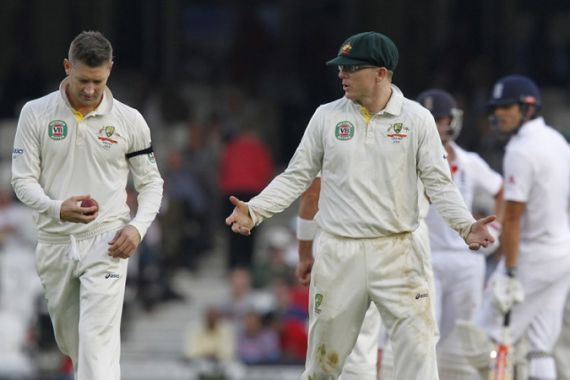Bad light leaves fans frustrated
England and Australia draw fifth Ashes Test as umpires declare bad light with hosts needing just 21 more runs to win.

England came close to pulling off a surprise victory over Australia in the fifth and final Test on Sunday but had to settle for a draw when umpires stopped play because of bad light.
Play came to a halt in the gloom of a London evening at The Oval with England agonisingly close to victory, needing just 21 runs from four overs.
Keep reading
list of 4 itemsAustralia’s Smith joins Washington Freedom before MLC cricket season
Jadeja reaches IPL cricket milestone in Chennai’s win over Kolkata
Sri Lanka beat Bangladesh by 192 runs to sweep Test series 2-0
Set 227 in 44 overs, England’s Kevin Pietersen and Jonathan Trott almost pulled off the victory with a 77-run partnership.
England were 206-5 when play was stopped. The 447 runs scored on Sunday are comfortably the most ever scored on the last day of a Test match.
Pietersen set The Oval alight with a fiery 50 in 36 balls.
High drama
| Final day scorecard |
|
England 377 & Second innings Fall: 1-22 86-2 3-163 4-170 5-206 Australia 492-9 declared & second innings D Warner c & b Anderson 12 Fall: 1-34 2-44 3-50 4-67 5-83 6-85 |
A day that started half an hour late and which was heading toward a dull draw ended in a 3-0 Ashes series victory for the home team. England was presented with the tiny pottery urn – said to contain the Ashes of English cricket – awarded to the winners of cricket’s famous rivalry.
Australia scored 492-9 declared in their first innings before the game was shortened by rain that prevented any play on Saturday’s fourth day at The Oval.
“Fair play to Australia for pushing the game on,” said captain Alastair Cook.
“It made for a really good spectacle. I’m very proud of the way the lads have done it,” he said before accepting the urn.
Sunday’s final day began in muted fashion, delayed by half an hour as the game limped toward a draw.
England resumed on 247-5 and added quick runs through Matt Prior, with 47, and Ian Bell with 45 to reach 377 all out.
Clarke decided on a risky strategy of trying to tempt Cook into accepting a run rate challenge by thrashing 111-6 in 23 overs and declaring at tea, setting England 227.
Clarke may have been hoping for some more runs but Stuart Broad snatched four wickets to slow the Australian run rate as Clark threw caution to the wind.
Root fell for just 11 with the score on 22 but Cook and Trott batted aggressively in a partnership of 64 before Cook fell leg before to a delivery from James Faulkner as he tried to clip a ball to midwicket. It was Faulkner’s fifth wicket of the day after he took his first four wickets earlier in England’s first innings.
Rematch
The two teams now face a gruelling series of one-day internationals and T20 games against each other at English venues before Australia fly home in mid-September after three and a half months in England.
Competition resumes in Australia at the end of November – a gap of just over two months – with another five-Test Ashes series.
It’s difficult to say which team will be more optimistic in Australia. The English have been the clear victors during the Ashes, but the Australians have run them closer than the 3-0 series defeat indicates.
At Old Trafford, rain played a big part in foiling an Australian victory.
The first Test win for England was by just 14 runs. The second match at Lord’s was a thumping 347-run win as Joe Root hit an impressive 180 and Ian Bell scored some of the more than 500 runs he posted during the Ashes.
With those two wins, and the draw at Old Trafford, the Ashes were lost to Australia. Ian Bell was the difference in a low-scoring fourth match in Durham, showing that it was the batsmen who made the difference.
While Australia’s bowlers, led by Peter Siddle and a Ryan Harris who managed to stay fit, were consistently dangerous and challenging, the batsmen were a major disappointment. Clarke managed a big innings of 187, but very few others impressed.
Usman Khawaja only managed 114 in six innings before he was dropped. Ed Cowan lasted just one game. Shane Watson scored 418 in 10 innings, but the Australians could not score runs when they really needed them.
The batting line-up became stronger as the tour wore on. David Warner had an astonishing tour.
He punched Root in a bar at the start, was banished to a tour in Zimbabwe but returned quickly as Australian form collapsed on England’s seaming wickets, where reverse swing is commonplace. Warner introduced solidity to the batting, as did Chris Rogers.
English bowlers like James Anderson and Stuart Broad have mastered the art of reverse swing, but will not find conditions as friendly on the hard, dry wickets in places like Melbourne, Perth and Adelaide.
Broad is likely to face hostility on and off the field in Australia, whose coach Darren Lehman described his refusal to walk after clearly edging a ball to slip as “blatant cheating.” Lehman was fined by the International Cricket Council for calling on Australians to give him a hostile reception.